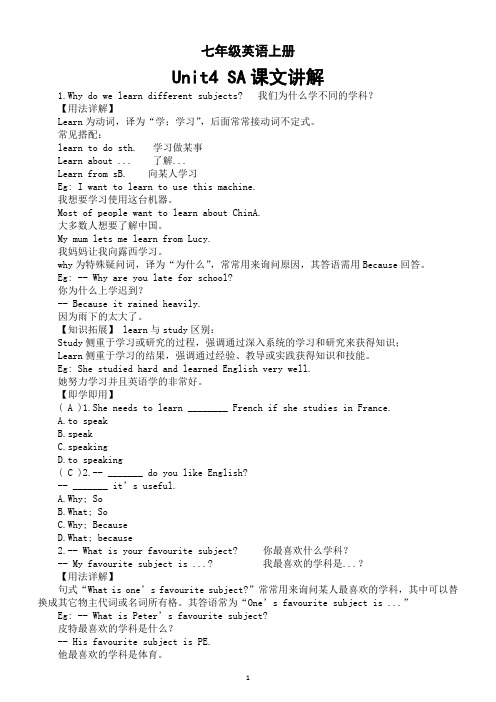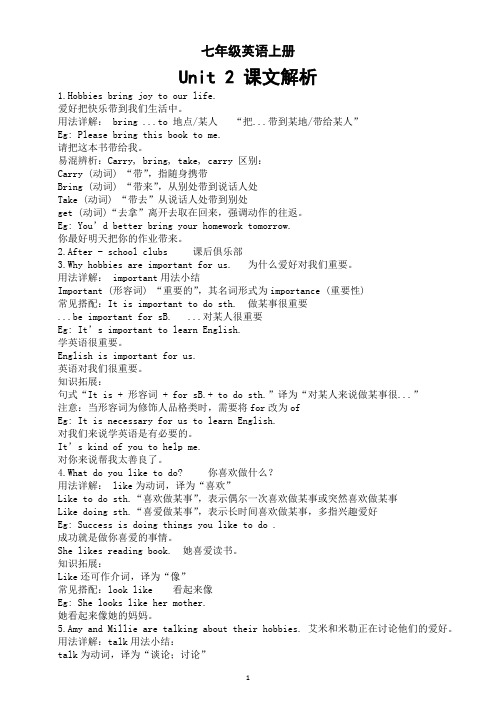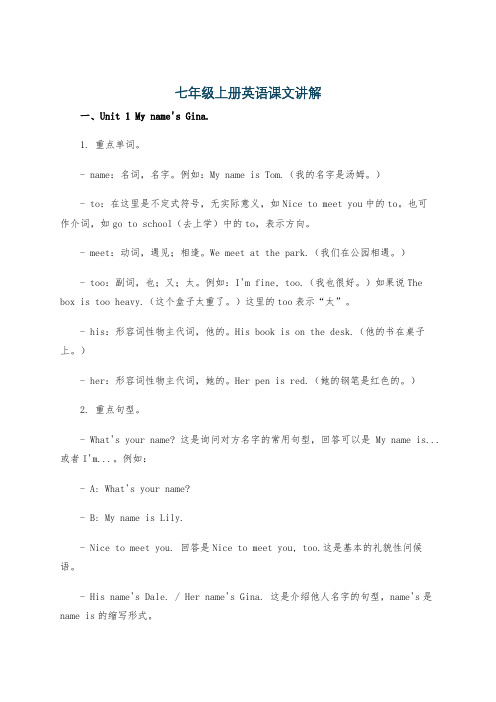最新七年级英语上册课文讲解学习
新版2024年人教版七年级英语上册课文课堂笔记

新版2024年人教版七年级英语上册课文课堂笔记Unit 1 My name's Gina.1.1 重点单词(1)name /neɪm/ 名词名字。
例如My name is Tom.(2)nice /naɪs/ 形容词美好的。
It's a nice day.(3)to /tuː/ 介词到向。
Go to school.(4)meet /miːt/ 动词遇见相逢。
Nice to meet you.(5)too /tuː/ 副词也。
I'm fine too.1.2 常见短语be from 来自。
例如I am from China.它表示某人的籍贯或者出生地。
1.3 句型结构My name is...和I'm...都可以用来介绍自己的名字。
My name is比较正式,I'm 比较口语化。
例如在正式的场合或者初次见面你可以说My name is Gina,而在朋友之间就可以说I'm Gina。
1.4 课文翻译Hello! I'm Gina. 你好我是吉娜。
Nice to meet you! 很高兴见到你What's your name? 你叫什么名字My name's Jenny. 我的名字是珍妮。
I'm Bob. Nice to meet you. 我是鲍勃很高兴见到你。
Nice to meet you too. 我也很高兴见到你。
1.5 文化知识在西方文化中,介绍自己的时候,通常会先说自己的名字,而且比较注重眼神交流和简单的握手礼仪。
当介绍他人的时候,会使用This is...的句型。
例如This is my friend Tom. 而且在西方人们更倾向于用名字称呼彼此,即使是不太熟悉的人,在互相介绍之后也会很快开始用名字称呼,这和一些东方文化有所不同。
Unit 2 This is my sister.1. 重点词汇(1) 家庭成员类单词的复数形式:sister的复数是sisters,brother的复数是brothers。
初中英语新仁爱版七年级上册Unit 1 Let’s Be Friends课文讲解(2024秋)

七年级英语上册Unit 1课文讲解1.What’s your friend like? 你朋友是什么样的?[用法详解]句式“What + be动词 + 主语 + like?”常常用来询问“主语怎么样?”注意:如果主语是人,则是用来询问“某人品格”知识拓展:在询问“某人外貌”时,用句式“What do/ does + 主语 + look like?”译为“某人长什么样?”Eg: What’s the weather like tomorrow? 明天天气怎么样?-- What’s your friend like? -- He’s friendly. -- 你朋友怎么样?-- 他很友好。
-- What does your friend look like? -- He has big eyes. -- 你朋友长什么样? -- 他长着大眼睛。
e a thinking map to describe a person 使用思维导图描述一个人[用法详解]use用法小结Use (名词) 使用;用途 (动词) 使用派生词为:reuse (动词) “重新使用”useful (形容词) “有用的”,useless( 形容词) “无用的”[常用短语]it’s useful to do sth. 做某事是有用的。
use sth. to do sth. “用某物做某事”Make good use of ... 充分利用...Be used to do sth. 被用来做某事Used to do sth. 过去常常做某事be used to doing sth. 习惯做某事Eg: It's useful to learn English well. 学好英语是有用的。
I use a pen to write this letter. “我用钢笔写这封信。
”We must make good use of our free time. 我们必须好好利用我们的空闲时间。
初中英语新人教版七年级上册Unit5 SB课文讲解(2024秋)

七年级英语上册Unit5 SB课文讲解1.I often act out stories with my brother at home. 我经常和我弟弟在家表演这些故事。
【用法详解】 with用法小结with为介词,意思比较多,常见意思如下:(1)“和…一起”Eg: I go to school with Lily. 我和莉莉一起去学校。
(2)“长着;戴着”Eg: The girl with big eyes is Lily. 那个长着大眼睛的女孩是丽丽。
(3)“拿着”Eg: Our teacher goes into the classroom with a book. 我们老师拿着一本书走进教室。
(4)“用”Eg: She wrote the letter with a pencil. 她用铅笔写字。
(5)“带有”Eg: I like drinking coffee with milk. 我喜欢和加奶的咖啡。
【即学即用】( B )1.She often goes to school _____ Mary.A.andB.withC.soD.as well as( D )2.I want some noodles _____ beef.A.andB.as well asC.alsoD.with2.I’m interested in nature.我对自然感兴趣。
【用法详解】Interested为形容词,译为“感兴趣的”,常常用来修饰人;Interesting为形容词,译为“有趣的”,常常用来修饰物,在句中可作定语和表语。
其名词形式为interest (名词) “兴趣”常见搭配:take an interest in doing sth.= be interested in doing sth. 对做某事有兴趣Eg: She is interested in reading books.= She takes an interest in reading books. 她对读书感兴趣。
初中英语新人教版七年级上册Unit 3 课文讲解(2024秋)

七年级英语上册Unit 3课文讲解1.Where is the dining hall? 餐厅在哪里?【用法详解】特殊疑问词where,译为“在哪里”,引导的特殊疑问句用来询问“某人或某物在哪里”。
注意:be动词要与主语的人称和数保持一致。
Eg: Where is your English book? 你的英语书在哪?Where are my keys? 我的钥匙在哪?【即学即用】( D )1.-- _____ my shoes?-- They’re unde r the beD.A.WhereB.Where’sC.Where’reD.Where are2.It’s in front of the art building. 在艺术楼前面。
【易混辨析】 in front of与in the front of的区别:In front of 译为“在...前面”,强调在物体的外部的前面In the front of 译为“在...前面”,强调在物体内部的前面Eg: There is a tree in front of our classroom. 我们教室前有一棵树。
(树在教室外面)There is a blackboard in the front of our classroom. 我们教室前有一块黑板。
(黑板在教室内部)【即学即用】( B )1.Tony is too short, so he sits ______ the classroom.A.in front ofB.in the front ofC.at the back ofD.at back of( C )2.There is a park _____ our school.A.In frontB.in the frontC.in front ofD.in the front of3.The teachers’ building is across from the school hall. 教师办公楼在学校礼堂对面。
初中英语新人教版七年级上册Unit4 Section A 课文讲解(2024秋)

七年级英语上册Unit4 SA课文讲解1.Why do we learn different subjects? 我们为什么学不同的学科?【用法详解】Learn为动词,译为“学;学习”,后面常常接动词不定式。
常见搭配:learn to do sth. 学习做某事Learn about ... 了解...Learn from sB. 向某人学习Eg: I want to learn to use this machine.我想要学习使用这台机器。
Most of people want to learn about ChinA.大多数人想要了解中国。
My mum lets me learn from Lucy.我妈妈让我向露西学习。
why为特殊疑问词,译为“为什么”,常常用来询问原因,其答语需用Because回答。
Eg: -- Why are you late for school?你为什么上学迟到?-- Because it rained heavily.因为雨下的太大了。
【知识拓展】 learn与study区别:Study侧重于学习或研究的过程,强调通过深入系统的学习和研究来获得知识;Learn侧重于学习的结果,强调通过经验、教导或实践获得知识和技能。
Eg: She studied hard and learned English very well.她努力学习并且英语学的非常好。
【即学即用】( A )1.She needs to learn ________ French if she studies in France.A.to speakB.speakC.speakingD.to speaking( C )2.-- _______ do you like English?-- _______ it’s useful.A.Why; SoB.What; SoC.Why; BecauseD.What; because2.-- What is your favourite subject? 你最喜欢什么学科?-- My favourite subject is ...? 我最喜欢的学科是...?【用法详解】句式“What is one’s favourite subject?”常常用来询问某人最喜欢的学科,其中可以替换成其它物主代词或名词所有格。
初中英语新译林版七年级上册Unit 2 Hobbies课文解析(2024秋)

七年级英语上册Unit 2 课文解析1.Hobbies bring joy to our life.爱好把快乐带到我们生活中。
用法详解: bring ...to 地点/某人“把...带到某地/带给某人”Eg: Please bring this book to me.请把这本书带给我。
易混辨析:Carry, bring, take, carry 区别:Carry (动词) “带”,指随身携带Bring (动词) “带来”,从别处带到说话人处Take (动词) “带去”从说话人处带到别处get (动词)“去拿”离开去取在回来,强调动作的往返。
Eg: You’d better bring your homework tomorrow.你最好明天把你的作业带来。
2.After - school clubs 课后俱乐部3.Why hobbies are important for us. 为什么爱好对我们重要。
用法详解: important用法小结Important (形容词) “重要的”,其名词形式为importance (重要性)常见搭配:It is important to do sth. 做某事很重要...be important for sB. ...对某人很重要Eg: It’s important to learn English.学英语很重要。
English is important for us.英语对我们很重要。
知识拓展:句式“It is + 形容词 + for sB.+ to do sth.”译为“对某人来说做某事很...”注意:当形容词为修饰人品格类时,需要将for改为ofEg: It is necessary for us to learn English.对我们来说学英语是有必要的。
It’s kind of you to help me.对你来说帮我太善良了。
4.What do you like to do? 你喜欢做什么?用法详解: like为动词,译为“喜欢”Like to do sth.“喜欢做某事”,表示偶尔一次喜欢做某事或突然喜欢做某事Like doing sth.“喜爱做某事”,表示长时间喜欢做某事,多指兴趣爱好Eg: Success is doing things you like to do .成功就是做你喜爱的事情。
初中英语新外研版七年级上册Unit 1 A new start课文讲解(2024秋)

七年级英语上册Unit 1课文讲解1.Start (名词) “开始” (动词) “开始” -- (同义词) begin常见搭配:the start of ......的开始Start to do/ doing sth.开始做某事Eg: A new start 一个新的开始I started to learn English at the age of six.我六岁开始学英语。
2.Feel excited about doing sth.对做某事感到兴奋Excited (形容词) “感到兴奋的”;常常用来修饰人Exciting (形容词) “令人兴奋的”;常常用来修饰物Eg: I’m excited about this exciting news.我对这个令人兴奋的消息感到兴奋。
3.Plan (名词) “计划” (动词) “计划”常见搭配:make a plan 制定计划Plan to do sth.计划做某事Eg: You should make a plan before you go there.在你去那之前应该制定一个计划。
They plan to have a holiday in Beijing.他们计划在北京度假。
4.By the end of ...“到...为止”At the end of...“到...为止”(可以是时间也可以是地点)In the end “最后;最终“Eg: We will learn 5000 words by the end of this month.这个月末我们将学习5000词。
Our work will finish at the end of this month.我们的工作这个月末结束。
There is a bookstore at the end of this street. 街道末尾有一个书店。
In the end, we finished our work on time.最后,我们按时完成了工作。
最新外研新Unit5课文讲解课件2024-2025学年新外研版七年级英语上册

2 Which animal can see things from the farthest away? b rabbit
c dog
3 Which animal can remember lots of information?
c elephant
a cow
b mouse
4 How many eyes does a bee have?
b horse
c giraffe
1 Which animal has the longest neck? a eagle
2 Which animal can see things from the farthest away? b rabbit
c dog
a monkey b horse c giraffe c elephant
c elephant
a cow
c dog b mouse
4 How many eyes does a bee have?
b five
c twelve
c two
an eagle b rabbit c dog a half
5 The hummingbird can eat ________its weight in 24 hours.
5 The hummingbird can eat ________its weight in 24 hours.
c two
a half
b about twice
c more than 5 times
单词
1.quize:n./v.小测验、随堂测验 2.eagle:n.鹰 3.humming bird:n.蜂鸟 4. weight:n.体重、重量
七年级上册英语第一单元的课文讲解

第一单元《Hello!》课文讲解一、背景介绍在七年级上册的英语课本中,第一单元的课文《Hello!》是一个非常基础的课文,主要介绍了英语中的问候语和自我介绍。
这个单元对于学生来说是一个很好的开始,可以帮助他们打好英语学习的基础。
二、课文内容概述1. 问候语的使用在这个课文中,学生将学习如何用英语进行简单的问候,比如“Hello!”、“Hi!”、“Good morning!”等等。
这些问候语在日常生活中非常常见,因此学生需要牢记并正确使用这些用语。
2. 自我介绍另外,这个课文还会教授学生如何用英语进行简单的自我介绍,比如“Hello, I'm Lily.”、“I'm from Beijing.”等等。
这些句子对于初学者来说非常重要,因为它们是学生和老师、同学进行交流的基础。
三、深度解析1. 问候语的用法在学习问候语的过程中,学生需要理解不同问候语的使用场合和对象。
比如“Good morning!”通常在早上使用,而“Hi!”则更随意一些。
学生还需要学会根据不同的场合选择合适的问候语,比如在正式场合使用“Hello!”,在朋友之间使用“Hi!”等等。
2. 自我介绍的技巧自我介绍是非常基础的交际技能,学生需要学会简洁地介绍自己,并且要会使用一些基本的句式和表达方式。
比如“Hello, I'm Tom.”、“I'm 13 years old.”、“I like playing basketball.”等等。
四、总结回顾在学完这个课文之后,学生应该能够用英语进行简单的问候和自我介绍,并且能够理解不同问候语和自我介绍句式的使用场合和技巧。
这个单元不仅打好了英语学习的基础,也为后续的学习打下了良好的基础。
五、个人观点作为英语老师,我认为这个课文非常适合七年级学生的英语学习。
它从最基础的问候语和自我介绍开始,循序渐进地帮助学生建立了英语交际的基础技能。
这对于学生的英语学习来说非常重要,因为只有打好了基础,才能更好地进行后续的学习。
初中英语新仁爱版七年级上册Unit 5 Loving Mother Nature课文讲解

七年级英语上册Unit 5课文讲解1.Appreciate the beauty of nature. 欣赏自然之美。
[用法详解]beauty为名词,译为“美丽;美人”;其形容词形式为beautiful(美丽的)。
pare and contrast 比较和对照[常见搭配]compare A with B 把A和B进行比较Compare ... to ... 把...比作...Compare with/ to ... 与...相比Eg: Paren ts shouldn’t compare their children with other children.父母不应该把他们的孩子和其他孩子进行比较。
Shakespeare compared the world to a stage. 莎士比亚把世界比作舞台。
Compared with/to him, I’m just a beginner. 和他相比,我只是一个初学者。
3.It has little rain here, so it’s very dry. 这几乎没有雨.[易混辨析]a few、few、a little与little区别:a few “一些;少许”后接可数名词复数,表肯定few “几乎没有”后接可数名词复数,表否定a little“一些;少许”后接不可数名词,表肯定little “几乎没有”后接不可数名词,表否定Eg: There are a few apples in fridge, you can eat one.冰箱里有一点苹果,你可以吃一个。
There are few apples in fridge, we should get some.冰箱里要没有苹果了,我们应该去买一些。
There is a little milk in fridge, you can drink some.冰箱里有点牛奶,你可以喝一些。
There is little milk in fridge, we should buy some.冰箱里没有牛奶了,我们应该去买点。
七年级英语上册(人教版2024)义务教育教材内容解读课件

新旧教材话题对比
旧教材
单元标题
Topic
Starter Unit 1 Good morning!
Meeting friends
Starter Unit 2 What's this in English?
Things around you
Starter Unit 3 What color is it?
What questions【what疑问句】
Letters S-Z【字母S-Z】
Review of the alphabet【复习字母表】
Starter Unit 3 Pronunciation of letters A, E, I, O,U
【字母A, E, I, O,U的发音】
What questions【what疑问句】
1a-1f(Unit 2&Unit 5 1a-1d) 1a-1d
2a-2c Section B 3a-3b(Unit 5 3a-3c)
Self Check
2a-2b Project(新增节点)(包含3a-3c) Reflecting(新增节点)
新旧教材体例结构对比
单元
导读页
旧教材
/
版块名
/
Unit 3 Unit 4
2012版教材目录分布
第一部分 目录结构比对
2024版教材目录分布
第一部分 目录结构比对
2012版人教版教材英语七年级上 册
2024版人教版教材英语七年级上册
1. 按照功能区域划分:如单元名称、话 题、功能、结构、目标语言、词汇、巩 固与拓展。
1. 按照板块划分:如单元名称、Section A板 块、Section B板块、项目板块
2024年冀教版七年级英语上册教学 Lesson 4 What do you like to do

Lesson 4What do you like to do?教学目标通过本课的学习,学生能够:1.获取文章内容,了解人们不同的兴趣爱好,形成信息结构图。
(学习理解)2. 在语境中正确运用saying、hobby、as、chess、creative、useful、club、weekend、match、discuss、skill、life、without、just、salt等词汇。
正确使用句型“I like to …” “It makes/helps me …”介绍自己的爱好及喜欢的原因。
(应用实践)3.掌握比喻句式的运用,提高语言表达能力。
讨论个人爱好,增强自我认知和人际交往能力。
(迁移创新)语篇研读What:本课语篇探讨了人们不同的兴趣爱好,引用了古老的谚语“Different people have different hobbies.”,同时文章强调了爱好的价值和意义,认为爱好使人变得有创造力且快乐。
Why:语篇讨论人们的爱好,在给学生提供丰富的语音、词汇、语法知识的同时,还是培养学生语言能力、发展学生思维的重要途径。
“兴趣爱好”是贯穿青少年成长的讨论话题,对于七年级学生来说更是如此。
本课以爱好相关的俗语为切入点讨论常见兴趣爱好的种类及作用,内容通俗易懂,主题贴近学生的生活,并且通过幽默的俗语总结拥有自己的兴趣爱好的重要性。
How: 本课语篇是一篇夹叙夹议的议论文。
首先引用了一句古老的谚语,引出主题。
接着,列举了不同人的爱好,包括作者自己喜欢下棋的原因。
最后,用一个比喻来强调爱好的重要性,将没有爱好的生活比作没有盐的食物。
教学过程设计理念:以《义务教育英语课程标准(2022年版)》核心素养为导向,以单元主题为引领,基于语篇的育人理念,体现《义务教育英语课程标准(2022年版)》“学Activity 6:Pairwork两两合作,完成谚语翻译Work in pairs. Translate thesayings in Activity 4 on page 37.教师观察学生能否完整地、顺利地翻译谚语,倾听学生的讨论并根据实际情况给出必要的指导和反馈设计意图通过对谚语的翻译,进一步了解爱好的作用,巩固本课重点知识【应用实践】Activity 7:Group work小组合作Finish Activity 5 on page 37.Write about your hobby and shareit in your group.教师观察学生写作情况和在小组内的分享情况,能否正确使用爱好和谚语的表达并根据实际情况给出指导和反馈设计意图引导学生联系实际生活,用所学语言完成实际任务,学以致用,进一步巩固目标语言的运用能力【迁移创新】板书设计Lesson 4What do you like to do?I like to…It makes/helps me…play sports creative healthylisten to music happy excitedplay Chinese chess smart relaxedread books active learn skillscollect cards make many friends……作业设计基础型作业:1.Review the words and phrases of this class.2.Read the passage and old sayings fluently.实践型作业:Write a short passage about personal hobbies and share it with your classmates.教学反思。
Unit 1 课文知识讲解(重点短语 句子解析)2024-2025学年新外研版七年级英语上册

外研版七年级上册新教材(讲义)Unit 1 A new start重点短语on the blackboard 在黑板上write down 记下start to do 开始做the first 第一个point out 指出...in the first lesson 在第一节课jump into my mind 跳进我的脑海look up at 抬头看think about 思考,想想看put up my hand 举起手来There is a mistake. 有一个错误。
Confucius 孔子Mencius 孟子well done 做得不错in fact 事实上all of you 你们所有人junior high school 初中more difficult 难度更大It’s important to do做某事这是很重要的the main idea of the passage 该文章的中心思想learn from 向…学习make mistakes 犯错it’s important for sb. to do sth.某人做事很重要。
come into 进入ask sb. to do sth 要求某人做些什么how about …怎么样fell so nervous 非常紧张地gave a silly answer 给出了一个愚蠢的答案turn red 变红with a smile 微笑着(脸上带着)make sb.+ adj. 让某人怎么样了the students' union 学生联合会at school 在学校all kinds of activities 各种活动such as 比如cultural festivals 文化节日sports meets 体育比赛sometimes 有时need to 需要describe our problems 描述我们的问题state our problems 说明我们的问题for example 例如It's hard to do sth. 这是很困难的去做......give sb. some advice 给某人一些建议the first 最先a piece of advice 一条建议the second 第二个look at 看look up 向上看/ 查阅(字典)by yourself 单独地、靠你自己problem 问题try your best 尽你所能work hard 努力工作read the passage 标题的含义find out 发现the meaning of the title 读这篇文章Do you remember...? 你还记得......吗?your sixth birthday 你的六岁生日made a paper boat 做了一艘纸船in the pool 在池中sail away 远航look at 查看It's a letter from sb. 这是某人的一封信。
七年级上册英语课文讲解

七年级上册英语课文讲解一、Unit 1 My name's Gina.1. 重点单词。
- name:名词,名字。
例如:My name is Tom.(我的名字是汤姆。
)- to:在这里是不定式符号,无实际意义,如Nice to meet you中的to。
也可作介词,如go to school(去上学)中的to,表示方向。
- meet:动词,遇见;相逢。
We meet at the park.(我们在公园相遇。
)- too:副词,也;又;太。
例如:I'm fine, too.(我也很好。
)如果说The box is too heavy.(这个盒子太重了。
)这里的too表示“太”。
- his:形容词性物主代词,他的。
His book is on the desk.(他的书在桌子上。
)- her:形容词性物主代词,她的。
Her pen is red.(她的钢笔是红色的。
)2. 重点句型。
- What's your name? 这是询问对方名字的常用句型,回答可以是My name is...或者I'm...。
例如:- A: What's your name?- B: My name is Lily.- Nice to meet you. 回答是Nice to meet you, too.这是基本的礼貌性问候语。
- His name's Dale. / Her name's Gina. 这是介绍他人名字的句型,name's是name is的缩写形式。
3. 语法点。
- 形容词性物主代词的用法:用来表示所属关系,后面必须接名词。
如my, your, his, her等。
例如:This is my pen.(这是我的钢笔。
)二、Unit 2 This is my sister.1. 重点单词。
- sister:名词,姐;妹。
I have a sister.(我有一个妹妹。
初中英语新人教版七年级上册Unit 3 Section B课文讲解(2024秋)

七年级英语上册Unit 3 Section B课文讲解1.How is your new school different from your old one? 你的新学校和旧学校有什么不同?【用法详解】Different为形容词,译为“不同的”,其名词形式为difference,译为“不同点”常见搭配:be different from... “与...不同”Eg: There are some differences between the books. 这两本书之间有些不同。
This book is different from that one. 这本书和那本书不同。
【即学即用】( C )1.Our school is _______ yours.A.differenceB.difference fromC.different fromD.different2.Thanks for you email.谢谢你的邮件。
【用法详解】Thanks for...译为“因...而感谢”,其同义词组为“thank you for...”,其后常常接名词、代词或动词ing形式,其答语常为You’re welcome.(不用谢)。
Eg: Thanks for your invitation. 谢谢你的邀请。
Thanks for inviting me. 谢谢你邀请我。
【知识拓展】email为名词,译为“电子邮件”。
因其元音音素开头,故前面用不定冠词an修饰。
Eg: I got an email from her. 我收到了一封来自她的电子邮件。
Email为动词时,译为“给...发电子邮件”。
常见搭配:email sB.at + 电子邮箱地址译为“给某人发电子邮件到...”Eg:*********************************.请发电子邮件******************.联系我们。
- 1、下载文档前请自行甄别文档内容的完整性,平台不提供额外的编辑、内容补充、找答案等附加服务。
- 2、"仅部分预览"的文档,不可在线预览部分如存在完整性等问题,可反馈申请退款(可完整预览的文档不适用该条件!)。
- 3、如文档侵犯您的权益,请联系客服反馈,我们会尽快为您处理(人工客服工作时间:9:00-18:30)。
一. 用适当的介词填空
45. I usually go __to___ bed __a_t__ eight o’clock. 46. Please take these things __t_o__ your sister. 47. Can you bring some things __t_o___ school? 48. The notebook is __o_n__ the floor. 49. To get __to___ work, he takes the number 17 bus __to__ a
一. 用适当的介词填空
1. What’s this __i_n__ English? 2. Call Alan __a_t___ 495-3539. 3. A set __o_f__ keys. 4. Thanks __f_or___ the photo __o_f__ your family. 5. Look __a_t__ the family photo. 6. Write __a_bo_u_t_ the people __i_n__ the photo. 7. Bring a photo __o_f__ your family __t_o__ school and write
__f_o_r_ only ¥18! 23. _F_o_r__ boys, you can buy socks _f_o_r__ only ¥5 each! 24. Come and see __f_o_r_ yourself _a_t___ Huaxing Clothes
Store.
25. Come __t_o__ Mr Cool’s Clothes Store! 26. Have a look __a_t __ Zig Zag’s Clothes Store. 27. The green shorts are __o_n__ sale _f_o_r__ ﹩25!
hotel. 50. The bus usually takes him __to___ work ___at___ 19:15. 51. People love to listen __t_o___ him. 52. People usually eat dinner __i_n__ the evening. 53. People usually eat breakfast __i_n__ the morning. 54. People usually eat lunch __in___ the afternoon. 55. Thanks __fo_r___ your letter. 56. Do you want to know __ab_o_u_t_ my morning? 57. Please write and tell me __a_bo_u_t_ your morning.
a letter __a_bo_u_t_ it. 8. The pictures are __o_n__ the wall. 9. The big windows are ___i_n___ the wall. 10. The keys are ___in___ the drawer. 11. The backpack is ___o_n___ the dresser. 12. My pencil sharpener is __i_n___ the backpack. 13. He only watches basketball game __o_n___ TV. 14. Jim is __i_n___ Class 116.
28. Do you have s School Day __at___ your school?
一. 用适当的介词填空
29. Do you go __to___ a movie? 30. What kind _o_f___ movies do you like?
31. She thinks she can learn a_b_o_u_t__ Chinese history. 32. I often go _to____ movies _w_i_th__ my friend. 33. He often goes to see Beijing Opera __on___ weekends. 34. Jet Li is __i_n__ the movie. 35. Are you good _w_i_t_h_ kids? 36. We need help _f_o_r__ our Beidaihe School Trip. 37. Can you help kids _w_i_t_h__ swimming? 38. Then you can be _in____ our school music festival. 39. Please call Zhang Heng __a_t__ 622-6033. 40. Musicians Wanted _F_o_r__ School Music Festival. 41. We want two good musicians _f_o_r__ our rock band. 42. I usually get up __a_t__ five o’clock.
一. 用适当的介词填空
15. Sandra Clark eats lots _of____ healthy food. 16. __F_o_r__ breakfast, she likes eggs, bananas and les.
17. __F_o_r__ dessert , she has ice cream. 18. Come and buy your clothes __a_t__ Huaxing’s great sale. 19. We have sweaters _a_t____ a good price. 20. We have great bags __fo_r___ only ¥12! 21. Do you need bags ___fo_r__ sports? 22. __F_o_r_ girls, we have T-shirtsin_____ red, green and white
